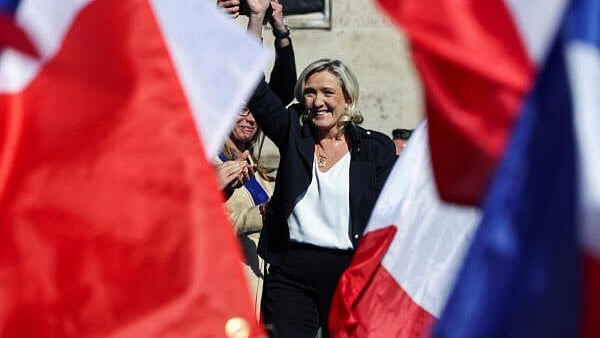
French far-right leader Marine Le Pen
Credit: Reuters Photo
No sooner Marine Le Pen stormed out of a Paris court that was delivering its verdict convicting her for financial embezzlement, and barred her from contesting the 2027 French presidential election, the trans-Atlantic far-right ecosystem rallied behind her crying injustice at the hands of a centrist and elitist ruling class.
As the clock ticked, judgement delivered, and minutes became hours, leaders of far-right parties across Europe and even a Russian foreign ministry spokesperson decried the conviction of the National Rally leader, the frontrunner for the 2027 polls, who is yet to recover from the bombshell judgement.
US President Donald Trump, his advisor and tech billionaire Elon Musk, prime ministers of Hungary and Italy, Victor Orban and Giorgia Meloni, Dutch right-wing leader Geert Wilders, and the Kremlin reacted sharply against the conviction. Trump called it a “witch hunt” from the same “playbook” used against him in the US. Both Trump and Musk blamed the “Left” for abusing the legal system to jail political opponents and launched a “Free Le Pen” campaign on social media.
US State Department spokesperson Tammy Bruce referred to Vice President J D Vance’s controversial remarks at the Munich Security Conference. In his typical rhetoric-driven speech, Vance had lambasted Europe for preserving its “old, entrenched interests” to suppress alternative viewpoints. Russian foreign ministry spokeswoman Maria Zakharova said France had “killed democracy.” Le Pen is the main political rival of French President Emmanuel Macron, whom Russia has fiercely criticised for his support of Ukraine.
These criticisms were in tandem with Le Pen’s long-held views against the Left and centrist liberals, and her allegations about judicial bias in France.
The judges who convicted Le Pen for embezzlement of funds handed an immediate five-year ban on holding any public office. She was accused of diverting more than €4 million ($4.3 million) of European Parliament Funds to pay her party staff.
The court also sentenced her to four years in prison, two years suspended and two in house arrest, and a €100,000 fine. While she can remain a member of parliament till the end of her current term, her electoral future depends solely on relief from the appellate court.
With a rating of 37%, the highest in recent memory, Le Pen was riding on support from the working class reeling under high costs of living and unemployment. Her anti-migration postures drove her popularity ratings when the court ruling dashed her hopes of contesting and possibly winning the presidential election.
But what worries Le Pen and her party is that she would miss the bus to take a fourth shot at the top office if an appeal is not fast-tracked. The verdict is unlikely to end her political career. One of the most popular and polarising political figures in France, Le Pen, 56, could make a political comeback with the help of her protege, 29-year-old social-media savvy Jordan Bardella as the party’s presidential candidate.
The succession plan
After losing the 2017 election to President Emmanuel Macron, Le Pen had carefully reshaped her image as a mainstream politician although without shedding her anti-system and anti-immigration positions that galvanised her party.
The ratings Le Pen enjoyed before the court verdict could spike with her supporters flaunting the victim card. If Bardella gets elected, he would certainly use his powers to pardon his mentor and help resurrect her political career. But she is yet to drop even a hint about nominating her protege for the election. Not one to give up so easily, she is certainly counting on her chances in the appeals court although an early start to the campaign is imperative for Bardella.
Le Pen has tried hard to rid her party of the extremist roots of her father Jean-Marie Le Pen, who founded and led the xenophobic and anti-Semitic National Front from 1972 to 2011. After rebranding it National Rally, Le Pen distanced herself from some of her father’s extremist positions, although she continues to flay “Islamisation” of France due to uncontrolled migration.
One early opinion poll showed that only 35% of French voters were “shocked” at the court verdict. But 46% thought Le Pen was treated harshly for political reasons.
Six out of ten voters felt that the conviction would not dim the fortunes of the National Rally. All this could mean that liberal-elite political forces would find it difficult to navigate Le Pen’s conviction that is already synergising European far-right.
(The writer is a senior journalist based in Berlin)